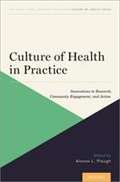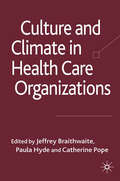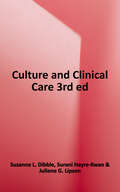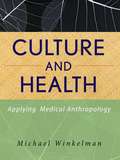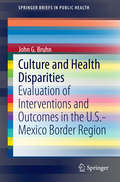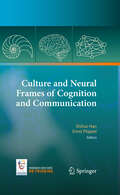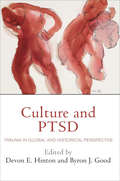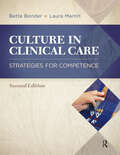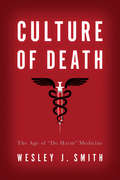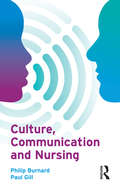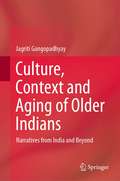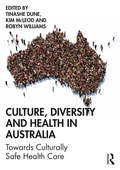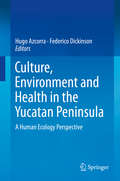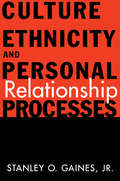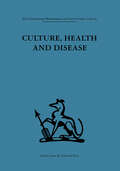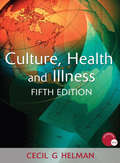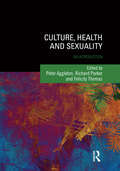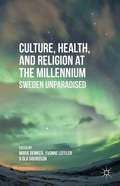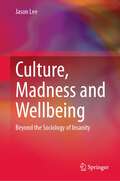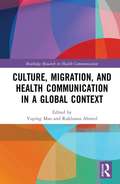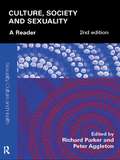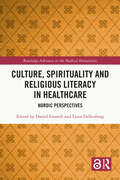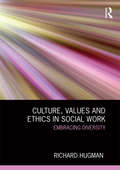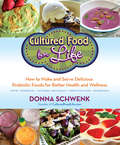- Table View
- List View
Culture Of Health In Practice: Innovations In Research, Community Engagement, And Action
by Alonzo L. PloughThis book concerns the importance of achieving health equity throughout the United States. Its publication is timely, given the major challenges in American health care in recent years. These include reductions in health care coverage, the loss of funding to tackle social determinants of health, and the growing risks associated with climate change. The abundant data that document health inequities in housing, education, incarceration, income, opportunity, and so much else in the United States reveal the extent of the health-based challenges the nation faces as a whole. <P><P>With these issues in mind, this book tackles a variety of topics centered on a "Culture for Health," and includes contributions from the Robert Wood Johnson Foundation's (RWJF) Sharing Knowledge to Build a Culture of Health conferences. The first part of this volume concerns the assets intrinsic to cultural identity and the contribution to the nation's well-being that this diversity brings. Next, the book calls attention to the places where people spend much of their time and shows how each setting has the power to generate health, or to undermine it. Finally, this book closes with a section on a broad range of interconnected topics that have drawn considerable attention from many fields and brought new perspectives to the table.
Culture and Climate in Health Care Organizations (Organizational Behaviour in Health Care)
by Catherine Pope Jeffrey Braithwaite Paula HydeThis book showcases international research on health care organizations. It presents diverse and multidisciplinary approaches to studying differing health care settings, in international context. These approaches range from in depth observation to questionnaire based measures, investigating a spectrum of health care professionals.
Culture and Clinical Care: Third Edition
by Suzanne L. Dibble Surani Hayre-Kwan & Juliene G. LipsonThis clinical guide highlights cultural practices related to daily life, transitions, and health/illness care for 32 cultures. All chapters were written by clinicians who are very familiar with the particular cultural group either by group membership or extensive study. We hope that the information contained here will assist with your clinical encounter by bringing awareness, sensitivity, and knowledge of your patient's heritage.
Culture and Health
by Michael WinkelmanCulture and Health offers an overview of different areas of culture and health, building on foundations of medical anthropology and health behavior theory. It shows how to address the challenges of cross-cultural medicine through interdisciplinary cultural-ecological models and personal and institutional developmental approaches to cross-cultural adaptation and competency. The book addresses the perspectives of clinically applied anthropology, trans-cultural psychiatry and the medical ecology, critical medical anthropology and symbolic paradigms as frameworks for enhanced comprehension of health and the medical encounter. Includes cultural case studies, applied vignettes, and self-assessments.
Culture and Health Disparities: Evaluation of Interventions and Outcomes in the U.S.-Mexico Border Region (SpringerBriefs in Public Health)
by John G. BruhnThe sister cities of the southwestern United States border are challenged by widespread environmental and health issues and limited access to help. And while different initiatives have been set up to improve health outcomes and lessen inequities in the border region, evaluation data are scarce. Culture and Health Disparities provides a perspective on U. S. -Mexico border health with an evidence-based guide for conceptualizing, implementing, and evaluating health interventions. Taking into account the unique qualities of border life and their influence on general wellbeing, this important volume offers detailed criteria for creating public health programs that are medically, culturally, and ethically sound. The book identifies gaps in intervention research on major health concerns in the area, relating them to disparity-reduction efforts in the rest of the U. S. and arguing for more relevant means of data gathering and analysis. The author also asserts that progress can be made on both sides of the border despite concurrent social and political problems in the region. Included in the coverage: The border region as a social system. The development of health disparities: a life-course model. A social systems approach to understanding health disparities. A critique of U. S. -Mexico border health interventions. Evaluating interventions to reduce healthcare disparities. Ethical issues in health interventions across cultures and contexts. A text for researchers and practitioners working to promote border health and reduce service inequalities, Culture and Health Disparities asks pertinent questions and provides workable, meaningful answers.
Culture and Neural Frames of Cognition and Communication (On Thinking #3)
by Ernst Pöppel Shihui HanCultural neuroscience combines brain imaging techniques such as functional magnetic resonance imaging and event-related brain potentials with methods of social and cultural psychology to investigate whether and how cultures influence the neural mechanisms of perception, attention, emotion, social cognition, and other human cognitive processes. The findings of cultural neuroscience studies improve our understanding of the relation between human brain function and sociocultural contexts and help to reframe the "big question" of nature versus nurture. This book is organized so that two chapters provide general views of the relation between biological evolution, cultural evolution and recent cultural neuroscience studies, while other chapters focus on several aspects of human cognition that have been shown to be strongly influenced by sociocultural factors such as self-concept representation, language processes, emotion, time perception, and decision-making. The main goal of this work is to address how thinking actually takes place and how the underlying neural mechanisms are affected by culture and identity.
Culture and PTSD: Trauma in Global and Historical Perspective (The Ethnography of Political Violence)
by Devon E. Hinton Byron J. GoodSince the 1970s, understanding of the effects of trauma, including flashbacks and withdrawal, has become widespread in the United States. As a result Americans can now claim that the phrase posttraumatic stress disorder (PTSD) is familiar even if the American Psychiatric Association's criteria for diagnosis are not. As embedded as these ideas now are in the American mindset, however, they are more widely applicable, this volume attempts to show, than is generally recognized. The essays in Culture and PTSD trace how trauma and its effects vary across historical and cultural contexts.Culture and PTSD examines the applicability of PTSD to other cultural contexts and details local responses to trauma and the extent they vary from PTSD as defined in the American Psychiatric Association's Diagnostic and Statistical Manual. Investigating responses in Peru, Indonesia, Haiti, and Native American communities as well as among combat veterans, domestic abuse victims, and adolescents, contributors attempt to address whether PTSD symptoms are present and, if so, whether they are a salient part of local responses to trauma. Moreover, the authors explore other important aspects of the local presentation and experience of trauma-related disorder, whether the Western concept of PTSD is known to lay members of society, and how the introduction of PTSD shapes local understandings and the course of trauma-related disorders.By attempting to determine whether treatments developed for those suffering PTSD in American and European contexts are effective in global settings of violence or disaster, Culture and PTSD questions the efficacy of international responses that focus on trauma.Contributors: Carmela Alcántara, Tom Ball, James K. Boehnlein, Naomi Breslau, Whitney Duncan, Byron J. Good, Mary-Jo DelVecchio Good, Jesse H. Grayman, Bridget M. Haas, Devon E. Hinton, Erica James, Janis H. Jenkins, Hanna Kienzler, Brandon Kohrt, Roberto Lewis-Fernández, Richard J. McNally, Theresa D. O'Nell, Duncan Pedersen, Nawaraj Upadhaya, Carol M. Worthman, Allan Young.
Culture in Clinical Care: Strategies for Competence
by Laura Martin Bette BonderCulture in Clinical Care: Strategies for Competence explores theory and practice to define and describe the multidimensional nature of culture and its interaction with an individual’s experience in the development of beliefs, values, and behavior. The newly updated Second Edition examines cultural beliefs related to health and wellness and how these beliefs and their associated actions affect intervention strategies.Based on ethnographic methods, strategies for culturally sensitive assessment and intervention are defined and illustrated, with ample opportunities for reflection and practice. Going beyond traditional fact-centered and attitude-centered approaches, Culture in Clinical Care, Second Edition describes the ways in which culture emerges as individuals interact with each other in physical and social environments. This one-of-a-kind text by Dr. Bette Bonder and Dr. Laura Martin provides health care practitioners and students with chapter objectives, critical thinking questions, interdisciplinary case studies and examples, numerous activities to build observation and interaction skills, comprehensive references and online resources, and images. The book’s organization emphasizes practice and reflection by interweaving theory, examples, and continuous hands-on application of concepts. Readers have the opportunity to practice what they are learning and evaluate their own effectiveness while being constantly reminded that all individuals in any interaction embody numerous cultural influences.Benefits of the updated Second Edition:• Training and practice in ethnographic methods that build awareness and skill• Numerous examples, exercises, and activities for reflection and observation• Interdisciplinary approach suitable for cross-disciplinary teaching contexts• Definition of health care professions themselves as cultures• Web and bibliographic resources• Case studies involving a wide range of practitioner disciplines and cultural groupsCulture in Clinical Care: Strategies for Competence, Second Edition fills a niche in health professions programs because of its combined emphasis on a theoretical foundation that highlights the individual as a cultural actor and on practical strategies and methods for clinical interventions.Instructors in educational settings can visit www.efacultylounge.com for additional material to be used in the classroom, including a sample syllabus.Occupational therapists, physicians, physician assistants, mental health professionals, and a variety of related health professionals will benefit from this interactive, interdisciplinary text.
Culture of Death: The Age of Do Harm Medicine
by Wesley J. SmithWhen his teenage son Christopher, brain-damaged in an auto accident, developed a 105-degree fever following weeks of unconsciousness, John Campbell asked the attending physician for help. The doctor refused. Why bother? The boy's life was effectively over. Campbell refused to accept this verdict. He demanded treatment and threatened legal action. The doctor finally relented. With treatment, Christopher's temperature-which had eventually reached 107.6 degrees-subsided almost immediately. Soon afterward the boy regained consciousness and was learning to walk again.This story is one of many Wesley J. Smith recounts in his award-winning classic critique of the modern bioethics movement, Culture of Death. In this newly updated edition, Smith chronicles how the threats to the equality of human life have accelerated in recent years, from the proliferation of euthanasia and the Brittany Maynard assisted suicide firestorm, to the potential for "death panels" posed by Obamacare and the explosive Terri Schiavo controversy.Culture of Death reveals how more and more doctors have withdrawn from the Hippocratic Oath and how "bioethicists" influence policy by posing questions such as whether organs may be harvested from the terminally ill and disabled. This is a passionate yet coolly reasoned book about the current crisis in medical ethics by an author who has made "the new thanatology" his consuming interest.
Culture, Communication and Nursing
by Philip Burnard Paul GillGood communication is an essential part of delivering effective nursing care. Nursing students work in a variety of multicultural settings and therefore it is imperative that they fully understand their own cultural context and that of others. This text illustrates the important differences between cultures and how these differences can enhance practical nursing. Through the comprehensive use of case studies and interactive exercises, the book invites students to reflect on their own knowledge and skills about culture so that they can learn to communicate in a more effective and culturally sensitive way. All theory is applied to nursing practice to demonstrate how situations can arise and be dealt with appropriately whilst working on clinical placement. This text is written for students studying the CFP at Year 1. Communication will be studied either as part of a Professional Issues module, or Nursing Practice.
Culture, Context and Aging of Older Indians: Narratives from India and Beyond
by Jagriti GangopadhyayThis book discusses the intersections between culture, context, and aging. It adopts a socio-cultural lens and highlights emotional, social, and psychological issues of the older adults in urban India. It is set in multiple sites such as Ahmedabad, Delhi, Kolkata, and Saskatoon to indicate how different cultural practices and contextual factors play an integral role in determining the course of aging. It also focuses on different narratives such as older adults living with adult children, older adults living with spouse, and older adults living alone to demonstrate the intricate process of growing old. Drawing from various sites and living arrangements of older adults, it sheds light on cultural constructions of growing old, ideas of belonging, the inevitability of death, everyday processes of aging, perceptions associated with growing old in India, acceptance of the aging body, and intergenerational ties in later lives. Given its scope, the book is essential reading for students and researchers in the fields of sociology, demography, and social scientists studying aging.
Culture, Diversity and Health in Australia: Towards Culturally Safe Health Care
by Tinashe Dune Robyn Williams Kim McLeodAustralia is increasingly recognised as a multicultural and diverse society. Nationally, all accrediting bodies for allied health, nursing, midwifery and medical professions require tertiary educated students to be culturally safe with regards to cultural and social diversity. This text, drawing on experts from a range of disciplines, including public health, nursing and sociology, shows how the theory and practice of cultural safety can inform effective health care practices with all kinds of diverse populations. Part 1 explores key themes and concepts, including social determinants of health and cultural models of health and health care. There is a particular focus on how different models of health, including the biomedical and Indigenous perspectives, intersect in Australia today. Part 2 looks at culturally safe health care practice focusing on principles and practice as well as policy and advocacy. The authors consider the practices that can be most effective, including meaningful communication skills and cultural responsiveness. Part 3 examines the practice issues in working with diverse populations, including Indigenous Australians, Culturally and Linguistically Diverse Australians, Australians with disabilities, Australians of diverse sexual orientation and gender identity, and ageing Australians. Part 4 combines all learnings from Parts 1–3 into practical learning activities, assessments and feedback for learners engaging with this textbook. Culture, Diversity and Health in Australia is a sensitive, richly nuanced and comprehensive guide to effective health practice in Australia today and is a key reference text for either undergraduate or postgraduate students studying health care. It will also be of interest to professional health care practitioners and policy administrators.
Culture, Environment and Health in the Yucatan Peninsula: A Human Ecology Perspective
by Hugo Azcorra Federico DickinsonThis book adopts a human ecology approach to present an overview of the biological responses to social, political, economic, cultural and environmental changes that affected human populations in the Yucatan Peninsula, Mexico, since the Classic Maya Period. Human bodies express social relations, and we can read these relations by analyzing biological tissues or systems, and by measuring certain phenotypical traits at the population level. Departing from this theoretical premise, the contributors to this volume analyze the interactions between ecosystems, sociocultural systems and human biology in a specific geographic region to show how changes in sociocultural and natural environment affect the health of a population over time. This edited volume brings together contributions from a range of different scientific disciplines – such as biological anthropology, bioarchaeology, human biology, nutrition, epidemiology, ecotoxicology, political economy, sociology and ecology – that analyze the interactions between culture, environment and health in different domains of human life, such as:The political ecology of food, nutrition and healthImpacts of social and economic changes in children’s diet and women’s fertilityBiological consequences of social vulnerability in urban areasImpacts of toxic contamination of natural resources on human healthEcological and sociocultural determinants of infectious diseasesCulture, Environment and Health in the Yucatan Peninsula – A Human Ecology Perspective will be of interest to researchers from the social, health and life sciences dedicated to the study of the interactions between natural environments, human biology, health and social issues, especially in fields such as biological and sociocultural anthropology, health promotion and environmental health. It will also be a useful tool to health professionals and public agents responsible for designing and applying public health policies in contexts of social vulnerability.
Culture, Ethnicity, and Personal Relationship Processes
by Stanley O. Gaines Jr.Culture, Ethnicity and Personal Relationship Processes reviews new theory and research on personal relationships among African, Latina/o and Asian Americans as well as personal relationships among different ethnic groups. The collection focuses on the give and take of affection and respect in personal relationships as influenced by specific cultural values. Using diverse strands of research from psychology, psychiatry, sociology and other disciplines, the contributors take both a retrospective and a prospective look at ethnicity and the reciprocity of affectionate and respectful behavior. Throughout the book, the reader will be challenged to take stock of common misperceptions currently blocking the way to a greater understanding of relational dynamics as a function of ethnicity.Contributors: Raymond Buriel, James Liu, and Diana Rios.
Culture, Health and Disease: Social and cultural influences on health programmes in developing countries
by Margaret ReadTavistock Press was established as a co-operative venture between the Tavistock Institute and Routledge & Kegan Paul (RKP) in the 1950s to produce a series of major contributions across the social sciences. This volume is part of a 2001 reissue of a selection of those important works which have since gone out of print, or are difficult to locate. Published by Routledge, 112 volumes in total are being brought together under the name The International Behavioural and Social Sciences Library: Classics from the Tavistock Press. Reproduced here in facsimile, this volume was originally published in 1966 and is available individually. The collection is also available in a number of themed mini-sets of between 5 and 13 volumes, or as a complete collection.
Culture, Health and Illness, Fifth edition
by Cecil HelmanCulture, Health and Illness is the leading international textbook on the role of cultural and social factors in health, illness, and medical care. Since first published in 1984, it has been used in over 40 countries within universities, medical schools and nursing colleges. This new edition meets the ever-growing need for a clear starting point in
Culture, Health and Sexuality: An Introduction (Sexuality, Culture and Health)
by Richard Parker Peter Aggleton Felicity ThomasThe last twenty years have seen a growth in multi-disciplinary work in the area of sexuality, culture and health. What was once a set of specialist concerns has been steadily mainstreamed. Alongside this, a broader interest has developed in ‘social’ and 'cultural’ factors relating to sexuality and sexual health, from family planning and STI management to gender and intimate partner violence and the technologisation of sex. This book offers a research-based overview of key topics relevant to social and cultural perspectives on sexuality and sexual health. Beginning with an extended introduction and divided into six sections, it looks at culture, sex and gender, sexual diversity, sex work, migration and sexual violence. Each section opens with an editorial discussion which places the theme, and the chapters that follow, in a contemporary context. Six additional substantive chapters can be accessed online at www.routledge.com/cw/aggleton. Including cutting-edge conceptual and empirical material from around the world, this is a key resource for students in, and across, a variety of academic disciplines in the social and health sciences. It is especially suitable for readers from sexuality studies, gender studies, development studies, anthropology and sociology as well as those with public health and social work backgrounds.
Culture, Health, and Religion at the Millennium: Sweden Unparadised
by Ola Sigurdson Marie Demker Yvonne LefflerThe book presents interpretations of culture, health, politics, and religion in Sweden today, Sweden transforms from the well-functioning but existentially bland economic wonder to a more fragmented and gloomy society. Contributors include scholars from film studies, literary studies, political science, religious studies and theology
Culture, Madness and Wellbeing: Beyond the Sociology of Insanity
by Jason LeeThis book is a unique study of the historical, theoretical, and cultural interpretations of ‘madness’ including interviews with those who have experiences of ‘madness’. It takes a transdisciplinary approach, employing historical, psychological, and sociological perspectives through an intersectional lens. This work explains how the prioritization of thinking over feeling in Western thought means the transrational imagination has frequently been negated in tackling mental health with detrimental results. This book, therefore, examines creative media, especially film, as a transrational form of human expression for healing and wellbeing, along with television, theatre, social media, music, and computer games. ‘Madness’ with regards to gender, sexuality, adolescence, and class in media and film is interrogated, as well as ‘madness’ and race through a focus on colonialism, post-colonialism, and psychiatry. It analyses group psychosis, including celebrity culture, and the ‘madness’ of leaders and gurus. This book challenges the lasting influence of the Age of Reason by furthering our understanding of the value of transrationality and the diverse ways of being human.
Culture, Migration, and Health Communication in a Global Context (Routledge Research in Health Communication)
by Yuping Mao Rukhsana AhmedBoth international and internal migration brings new challenges to public health systems. This book aims to critically review theoretical frameworks and literature, as well as discuss new practices and lessons related to culture, migration, and health communication in different countries. It features research and applied projects conducted by scholars from various disciplines including media and communication, public health, medicine, and nursing.
Culture, Society and Sexuality: A Reader (Sexuality, Culture and Health)
by Richard Parker Peter AggletonThis new and revised edition of Culture, Society and Sexuality brings together and makes accessible a broad and international selection of readings to provide insights into the social, cultural, political and economic dimensions of sexuality and relationships, and emerging discourses around sexual and reproductive rights. Clearly structured and presented, the book makes an extremely useful reference for students and researchers. Section one focuses on the social and cultural construction of sexuality as an emerging field of inquiry over the course of recent decades, and examines some of the most important theoretical insights and areas of investigation that have emerged as this field has developed. Section two links research on the construction of sexuality to a growing body of work on gender and sexuality in relation to a wide range of practical issues and contemporary social policy debates. It is an essential reader not only for students and researchers in these areas, but also for activists, health workers and service providers, who daily confront practical and policy issues related to sexuality, sexual health and sexual rights.
Culture, Spirituality and Religious Literacy in Healthcare: Nordic Perspectives (Routledge Advances in the Medical Humanities)
by Daniel Enstedt Lisen DellenborgElaborating with the concepts of culture and religious literacy, this volume examines theoretical, methodological and empirical aspects of the practice and study of religion and non-religion, culture, spirituality and worldviews within healthcare. In modern multi-cultural and multi-religious societies, a host of new issues have arisen concerning culture, religion and spirituality within healthcare, especially when people face serious and life-limiting illness. Healthcare professionals are faced with challenges addressing and handling patients’ cultural expressions of religiosity, spirituality and existential concerns. The variety needs to be met without essentializing the concepts of culture and religion, and with an ability to include the non-religious as well as new types of spiritualities. This collection reflects on the tension between cultural, religious and spiritual dimensions of care in a secularized healthcare institution and describes implications of this tension for healthcare professionals and patients. The book engages with an ongoing scholarly discussion about religious literacy in healthcare, and contributes perspectives, experiences and empirical examples from the Nordic countries, especially Sweden. It gives suggestions for practical application of research to healthcare practice, highlighting challenges and ideas for how to integrate religious, non-religious, and spiritual dimensions in care. This is an important contribution to the literature on religious literacy and provides a vital reference for students, scholars and healthcare professionals with an interest in the complex relationship between culture, spirituality, and religion in healthcare.
Culture, Spirituality and Religious Literacy in Healthcare: Nordic Perspectives (Routledge Advances in the Medical Humanities)
by Daniel Enstedt Lisen DellenborgElaborating with the concepts of culture and religious literacy, this volume examines theoretical, methodological and empirical aspects of the practice and study of religion and non-religion, culture, spirituality and worldviews within healthcare.In modern multi-cultural and multi-religious societies, a host of new issues have arisen concerning culture, religion and spirituality within healthcare, especially when people face serious and life-limiting illness. Healthcare professionals are faced with challenges addressing and handling patients’ cultural expressions of religiosity, spirituality and existential concerns. The variety needs to be met without essentializing the concepts of culture and religion, and with an ability to include the non-religious as well as new types of spiritualities. This collection reflects on the tension between cultural, religious and spiritual dimensions of care in a secularized healthcare institution and describes implications of this tension for healthcare professionals and patients. The book engages with an ongoing scholarly discussion about religious literacy in healthcare, and contributes perspectives, experiences and empirical examples from the Nordic countries, especially Sweden. It gives suggestions for practical application of research to healthcare practice, highlighting challenges and ideas for how to integrate religious, non-religious, and spiritual dimensions in care.This is an important contribution to the literature on religious literacy and provides a vital reference for students, scholars and healthcare professionals with an interest in the complex relationship between culture, spirituality, and religion in healthcare.Chapter 6 of this book is freely available as a downloadable Open Access PDF at http://www.taylorfrancis.com under a Creative Commons [Attribution-Non Commercial-No Derivatives (CC-BY-NC-ND)] 4.0 license.
Culture, Values and Ethics in Social Work: Embracing Diversity
by Richard HugmanThis groundbreaking book examines the ways in which questions of culture and diversity impact on the values and ethics of social work. Using detailed case studies to illustrate key points for practice, Richard Hugman discusses how social workers can develop cross-cultural engagement in practice and work creatively with the tensions it sometimes involves. Debates rage over whether there is a core set of unchangeable social work values or whether they might be different at different times and for different people. This textbook proposes a new approach of ‘ethical pluralism’ for social work practice, in which both shared humanity and the rich variety of cultures contribute to a more dynamic way of understanding social work’s underpinning values and ethics. In particular, this book explores the implications of a pluralist approach to ethics for the central questions of: Human rights and social justice Caring relationships Social and personal responsibilities Agency and autonomy Values such as truth, honesty, openness, service and competence. It is vital that social workers understand the values and ethics of their profession as a crucial part of the foundations on which practice is built and this is the only text to explore the connections between culture, values and ethics and fully develop the pluralist approach in social work. Culture, Values and Ethics in Social Work is essential reading for all social work students and academics.
Cultured Food for Life: How To Make And Serve Delicious Probiotic Foods For Better Health And Wellness
by Donna SchwenkDonna Schwenk's world changed when she discovered cultured foods. After a difficult pregnancy and various health problems, she became determined to find answers to what ailed her. And in her quest, she came across the ancient art of home fermentation, a food preparation technique that supercharges everyday foods with beneficial bacteria to balance your digestive system, and vitamins and minerals to enhance your overall health. This simple, natural process has been used for thousands of years to create everything from drinks like kefir and kombucha to foods like kimchi and pickles. After incorporating fermented foods into her life, Donna began to experience a vitality that she had never known. And then she was hooked! She started a new life as a teacher and writer, blogging on her website culturedfoodlife.com, in an effort to bring the beautiful world of fermented foods to as many people as possible. She now works with thousands of people to open the door to a world of foods that can help improve an array of health problems including high blood pressure, diabetes, allergies, acne, hypertension, asthma, and irritable bowel syndrome. In Cultured Food for Life Donna brings this same information to you and shows you that preparing and eating cultured foods is easy, fun, and delicious! After speaking to the science behind the healing power of probiotic foods and telling the astonishing story of how she healed herself and her family, Schwenk walks you, step by step, through the basic preparation techniques for kefir, kombucha, cultured vegetables, and sprouted flour, plus more than 135 recipes that use these foods to create dishes to please any palate. With recipes like Herbed Omelet with Kefir Hollandaise Sauce,Sprouted Ginger Scones with Peaches and Kefir Cream,Kefir Veggie Sprouted Pizza, Apple Sauerkraut, and Brownie Cupcakes with Kefir Frosting, along with inspirational stories from Donna's family and friends, you'll learn everything you want to know about a diet that's as tasty as it is healthy.
